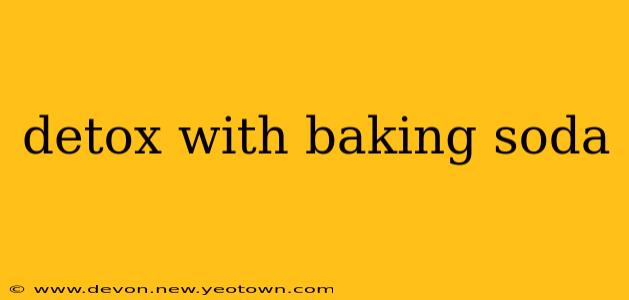Can Baking Soda Detox Your Body? The Truth Behind the Hype
The internet is awash with claims about miracle detox solutions, and baking soda often takes center stage. But can this common kitchen staple truly detox your body? Let's delve into the science and separate fact from fiction. This isn't about quick fixes or overnight transformations; it's about understanding how your body naturally detoxifies and the role (or lack thereof) baking soda plays.
My journey into this topic began with a friend's enthusiastic recommendation. She swore by a baking soda cleanse, claiming it had cleared her skin and boosted her energy levels. Intrigued, but also skeptical, I embarked on extensive research, poring over scientific studies and consulting experts in nutrition and medicine. What I discovered was far more nuanced than the simple claims online.
What is a "Detox," Anyway?
Before diving into baking soda's role, let's clarify the concept of detox. Your body already possesses a remarkable, built-in detoxification system. Your liver, kidneys, lungs, and skin work tirelessly to filter out and eliminate toxins naturally. These toxins come from various sources—environmental pollutants, processed foods, and even normal metabolic processes. The idea of a "detox" often implies a need to supplement or enhance these natural processes, a concept that needs careful consideration.
How Does Baking Soda Work in the Body?
Baking soda, or sodium bicarbonate, is an alkaline substance. When ingested, it can temporarily alter your body's pH balance, making it slightly more alkaline. Proponents suggest this alkalization helps flush out toxins. However, your body is incredibly efficient at regulating its pH, and this effect is typically short-lived and minimal. Significant changes to your body's pH can be dangerous.
Can Baking Soda Help with Specific Health Issues?
While baking soda isn't a miracle detox, it does have some legitimate uses, albeit not related to a systemic "detox":
-
Indigestion: A small amount of baking soda can neutralize stomach acid, providing relief from heartburn or indigestion. However, overuse can lead to side effects.
-
Kidney Stones: In certain cases, under medical supervision, baking soda might help prevent the formation of kidney stones by increasing urine pH. This is not a home remedy and requires careful monitoring by a healthcare professional.
-
Acne: Some anecdotal evidence suggests that topical application of baking soda can help with acne, but more rigorous scientific studies are needed. Always patch test before widespread use.
What are the Risks of Using Baking Soda for Detox?
While generally safe in small amounts, excessive consumption of baking soda can lead to several adverse effects, including:
-
Electrolyte imbalance: This can cause muscle cramps, weakness, and even heart problems.
-
Nausea and vomiting: Excessive alkalinity can upset your stomach.
-
Kidney problems: High sodium intake can strain your kidneys.
It's crucial to remember: Never attempt a baking soda detox without consulting a healthcare professional. The risks outweigh any potential benefits, and doing so could seriously harm your health.
Are there Natural Ways to Support Your Body's Detoxification?
The best way to support your body's natural detoxification processes is through a healthy lifestyle:
-
Hydration: Drink plenty of water to help flush out waste products.
-
Balanced diet: Eat a diet rich in fruits, vegetables, and whole grains. Limit processed foods, sugary drinks, and excessive alcohol consumption.
-
Regular exercise: Physical activity promotes healthy circulation and elimination.
-
Sufficient sleep: Your body repairs and detoxifies itself during sleep.
In conclusion, while baking soda has some legitimate uses, it's not a detox solution. Your body's natural detoxification systems are far more effective and efficient. Focus on a healthy lifestyle instead of chasing quick fixes, and always consult a doctor before making significant changes to your diet or health routine. The path to health and well-being is a holistic one, built on sustainable practices rather than fleeting trends.

